The decision to jail eight members of the Catalan government, and to issue an arrest warrant for the Catalan president Carles Puigdemont, along with a further four members of his government, is an unprecedented and very serious violation of basic democratic rights that has revived the Catalan independence movement.
It has led to justified anger in Catalonia and protests in the streets. What we are up against is the whole of the 1978 regime, which can only be defeated through sustained mass action, the strengthening and coordinating of the Committees for the Defence of the Republic, and a general strike.
On Thursday morning, all members of the Catalan government and all members of the presidency of the Catalan Parliament were summoned by Spanish tribunals on charges of rebellion, sedition and misuse of public funds for their part in the 1 October independence referendum and the declaration of the Catalan Republic on 27 October.
Members of the Catalan government and Parliament speakers were harassed on their arrival in Madrid on Wednesday night by a mob waving Spanish flags, which included the openly-Nazi Hogar Social, as well as other far-right organisations. The last few months have seen a marked increase in the activity of fascist gangs, which act like fish in the water in the midst of the state sponsored campaign of reactionary Spanish nationalism.
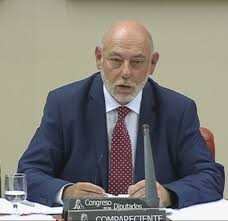
Members of Catalan government have been sacked by the Spanish government under the Article 155 coup and so have no immunity. Their case will be heard at the National Court (Audiencia Nacional). The state prosecutor, Jose Manuel Maza asked for detention without bail for all of them. In court, eight members of the Catalan government, including Vice-President Oriol Junqueras, refused to answer any questions from the prosecutor, and only dealt with those from their own lawyers.
The exception was that of Santi Vila, who resigned from Catalan government in protest against the declaration of independence and has his own defence team (the same lawyers who defended the Spanish princess from charges of corruption). Santi Vila is the only one who agreed to answer questions from the prosecutor yesterday.
In a radio interview the day before he had openly declared that he had knowingly sabotaged the process towards a Catalan Republic for months. It is also public record that he always argued against breaking the law in any way (in effect attempting to prevent any steps forward. He is considered as a traitor by many, and the state prosecutor recommended he should be released on bail, which the judge set at 50,000 Euros. Vila is standing to be the candidate of Puigdemont’s PDECAT party in the forthcoming Catalan elections on 21 December. He presents himself as the reasonable voice of moderation.
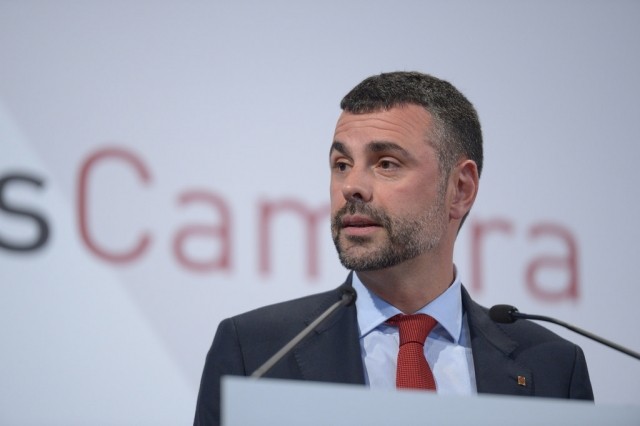
Catalan President Puigdemont and four other members of his government remain in Brussels, where they went on Monday, and did not turn up. Instead they requested to be interviewed by video-link. The state prosecutor asked the judge for an arrest warrant. Spanish papers reported last night that National Court judge Lamela, dealing with this case, had agreed to it and was preparing the warrant. The decision of judge Lamela to remand eight members of the government in custody pending trial vindicates Puigdemont’s decision not to turn up.
After the decision of the judge, Maza argued that they could have avoided jail, had they declared that they would “abide by the Constitution” and abandoned “the criminal line of the Catalan Republic”. There you have it in black and white. Their ‘crime’ according to the Spanish state is having dared to declare a Republic and actively worked for that purpose. The reason they are going to jail now, pending trial, is that they do not renounce their views. You cannot described them in any other way than political prisoners.
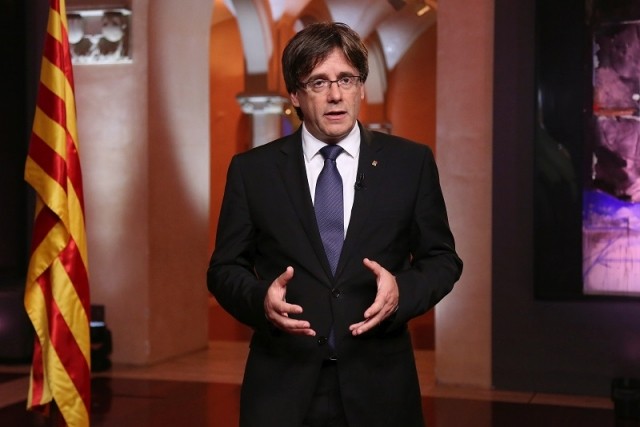
Members of the Catalan parliament presidency (including Communist deputy Joan Josep Nuet) appeared in front of the Supreme Court, as they retain parliamentary immunity. The judge agreed to a request of another week to prepare their defence and allowed them to go without fixing any bail, though they will be under police protection. Their ‘crime’ is having allowed the discussion in Parliament of motions regarding the declaration of an independent Catalan Republic. For the Spanish state the free discussion of political matters in a democratically elected parliament is a crime.
The charges
Crimes of rebellion and sedition, of which members of the government are indicted, were inherited without any modification from the 1944 Franco-era penal code. This fact tells you a lot about the real nature of the 1978 regime in Spain. The pact between the Franco regime and the leaders of the workers’ parties PCE and PSOE, included the wholesale adoption of the state apparatus and its many of its legal structures, which remain to this day. The National Court itself is the continuation of the old Public Order Tribunal of the Franco regime, which in turn had inherited functions from the Special Tribunal for the Repression of Masonry and Communism.
Judge Carmen Lamela is also in charge of the case against the Alsasua youth. A year ago there was a confrontation between off duty civil guards and a group of local youth in the town of Alsasua, Navarre. What was in effect a low key incident in which no-one was seriously injured was turned by judge Lamela and the state prosecutor into a case of terrorism! This despite the fact that ETA already announced it renounced armed struggle five years earlier, that the youth were not accused of belonging to ETA and that none of them were armed! No crime is too small for judge Lamela and the National Court. If the actions of unarmed youth in a bar can be turned into terrorism, imagine what she can do with people who have dared to challenge one of the principles of the 1978 regime: the sacred unity of the Spanish nation.
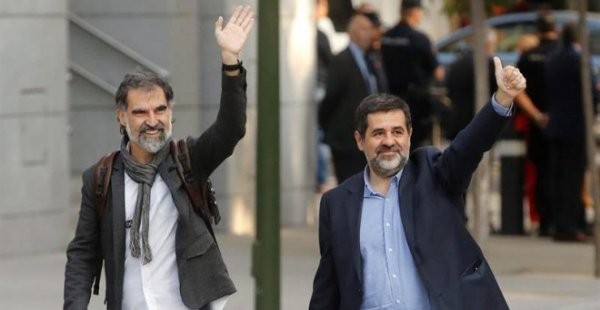
Sedition implies a “tumultuous mob” preventing the action of the authorities or the implementation of the law. It carries a maximum jail sentence of 15 years. The leaders of the two largest pro-independence organisations, Jordi Sánchez from the Catalan National Assembly and Jordi Cuixart from the Òmnium Cultural, have been charged with sedition in relation to the 20 September demonstrations. Then, tens of thousands attempted to prevent the arrest of 14 high ranking Catalan officials by the Spanish police and searches by the Civil Guard in a number of Catalan government buildings.
The crowds were peaceful and there were no clashes. Furthermore, the two Jordis acted to calm the crowds and attempted to guarantee the Civil Guards and court officials safe passage out of the building of the Economy Department. Far from encouraging a riotous mob, they attempted to calm it down! None of that matters to the Spanish state prosecutor and the National Court. They want to mete exemplary punishment so that no-one can get the impression that mass civil disobedience carries no consequence. The same National Court judge Lamela ruled they should be remanded in custody and they have now spent over a fortnight in jail.
Rebellion carries a maximum jail sentence of 30 years. The crime of rebellion implies “rising up in a violent and public manner”. The fact that there has been no violent uprising in Catalonia did not deter the state prosecutor, nor judge Lamela who accepted these charges. State prosecutor Maza argued that the 1 October referendum on independence (called by the Catalan Parliament and outlawed by the Spanish state) constituted an uprising, and that rebellion does not necessarily imply “physical violence” if “the uprising is of such a scale that it has a sufficient capacity of intimidation to discourage action by security forces”.
In other words what is on trial here is the exercise of the right of self-determination. In a sign of its vindictive character, it was revealed that the prosecutor had named the file with the indictment against the Catalan government “the harder they’ll fall”.
Also today, the National Court had summonsed the 12 members of rap collective La Insurgencia, for “glorifying terrorism” in their lyrics. This in a country where there are no active terrorist groups!
A massive response in the streets of Catalonia
At noon there have been rallies in town squares against these prosecutions. Hundreds have also welcomed members of the Catalan parliament back on their arrival in Barcelona in the afternoon. The Barcelona council has passed a motion recognising the legitimacy of the Catalan government and rejecting Article 155, though it has rejected another one recognising the Catalan republic.
When news of the judge’s decision to jail the 8 Catalan government members were announced there was an uproar of rage. Immediately people started to gather in the town squares. In Barcelona there were road blockades and thousands marched to the Parliament building where there was an impromptu rally. The leaders of the ANC and Omnium spoke as well as leaders of the CUP, Podem and other organisations. The idea of a the need for a general strike emerged from the rally.
One of the CUP members of Parliament, Albert Botrán received a massive ovation when he spoke of the need to repeat the 3 October strike, “one, two, three, four, many times”. People remember the impressive general strike and civic stoppage of 3 October against repression and the power that was revealed on that day.
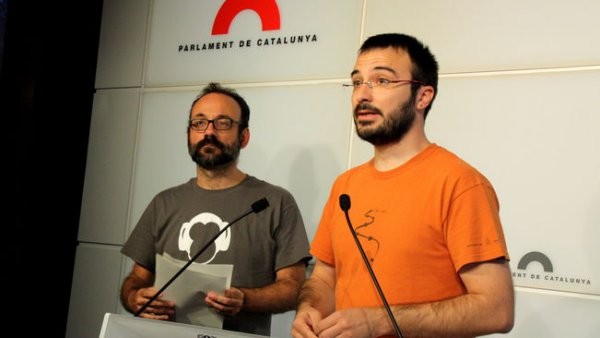
Tens of thousands gathered in other towns and cities, in Rubí, Cornellá, Olot, Vic, Reus, Tarragona, Lleida, Girona, Sabadell and many more. In Torredembarra 300 people cut off the main roads leading to the town. The movement was semi-spontaneous and was followed by a very loud session of banging of pots and pans at 10pm.
A press conference has been called for today, Friday 3 November, to call for a general strike next week. Universities for the Republic has called for a student strike and rallies in all campus at noon. More mobilisations will certainly follow. The original call from the ANC for a mass demonstration on Sunday 12 November will prove to be too little too late.
After the way in which the Catalan government did nothing after the Republic was proclaimed a week ago, now people want to go out into the streets and fight for it, not just for the release of the political prisoners, which is what has sparked this new wave of the movement.
The 21 December election
In a certain way, the decision of the prosecutor and the judge has thrown the plans of the ruling class into disarray. They hoped to smash the movement through judicial repression and the application of Article 155 and then quickly move to the 21 December election where they thought they would get a substantial unionist majority. Opinion polls so far show that would not be the case. The polls predict a renewed majority for the pro-independence parties and a substantial majority for independence.
What is clear is that the jailing of the Catalan government members has strengthened the camp of those who want a Catalan Republic, not the other way round. The decision has also increased the contradictions within the Catalan Socialist Party (PSC), where a number of prominent local mayors had already issued a statement rejecting Article 155 (which the party fully backs). Now the mayor of Terrassa (the second largest Catalan city the party rules) has resigned as a mayor and torn the party card. It is not ruled out that further down the line, if the Spanish state is facing a defeat, they might take further measures to illegalise some parties or lists, or prevent them from standing on a program, which is “against the Constitution”.
These polls should be taken with caution as it is not even clear which parties will be standing and what coalitions or fronts will be formed. There has been a call from the ANC and Òmnium for a joint pro-independence list, which could turn the elections into a de facto referendum on independence. Others have called for a broad front for democracy and against Article 155. There are also talks about the possibility of a joint slate involving the anti-capitalist CUP, the centre left ERC (which would break from its current partners, the bourgeois nationalist PDECAT) and Podem.
This has already led to a major rift within Podemos. The national leadership has been at loggerheads with the Catalan leadership of Podem for many months. First, members in Catalonia rejected a botched attempt at forcing them into a coalition with ICV-EUIA and Ada Colau’s BEC to form the new Catalunya en Comú formation.
While opposing independence, the secretary of Podem, Albano Dante-Fachín, has been very principled in defending the right of self-determination through participation in the referendum and has build close, comradely links with the ranks of the left-wing independence organisations. The leadership of Podemos resents his independence. Their position is extremely opportunistic and their organisational methods very bureaucratic. While formally in favour of self-determination, they opposed the 1 October referendum (as it had “no guarantees”) and Pablo Iglesias said that if he were Catalan he would not participate. When they forced an electronic ballot of Podem members, they were rebuffed when over 7,000 turned out and voted by a wide margin to participate in the referendum.
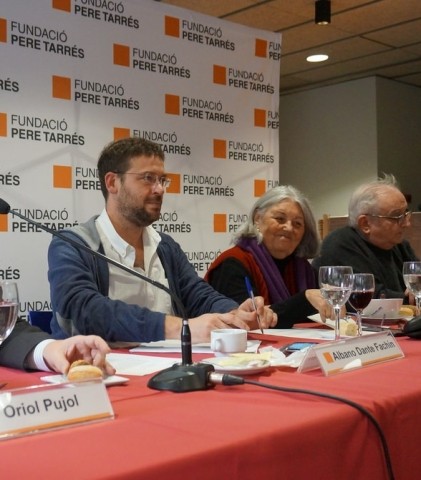
Now they are in a hurry to back Catalunya en Comú and want to force Podem into it. The Podem leadership has argued, correctly, that these are not normal elections, taking place as a result of the Article 155 coup against Catalan institutions, and that they would open talks with all the formations, which defended the protest strike against repression on 3 October.
For the Pablo Iglesias leadership, even talking to pro-independence parties is anathema, as they think that would be a vote loser in the rest of Spain. Albano has replied that one has to stand for principles and then attempt to convince the public, rather than change one’s principles according to suit opinion polls. Podemos has now by-passed the Catalan leadership and started an online consultation of its members with a loaded question, which gives no other option than joining Catalunya en Comú. It can still backfire.
A common front of all those who want a Catalan Republic, which breaks not only with the 1978 regime but also with capitalist austerity and cuts, would certainly get massive support. PDECAT is now extremely discredited even in the pro-independence camp. Many have realised, through practical experience, that its leaders either did not want to go all the way or their strategy (appeals to the EU) was completely hopeless.
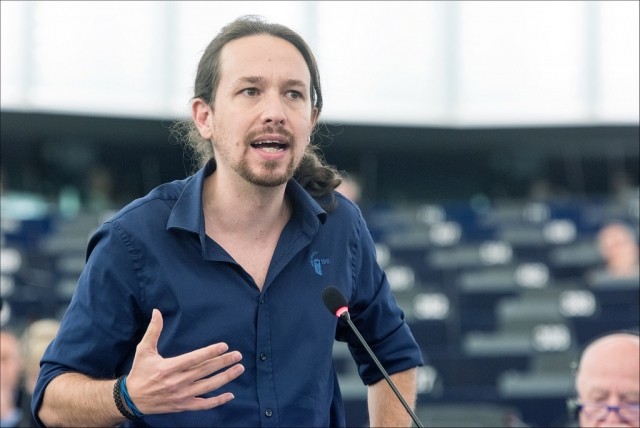
Marxists have the duty of standing in solidarity with all those jailed today by Spanish courts on charges, which amount to an assault on democratic rights and, which reveal the very limited nature of the 1978 regime’s bourgeois democracy. It doesn’t really matter that many of them are bourgeois politicians whose policies we fundamentally oppose. They are not charged for those, but rather for standing for the basic democratic right of self-determination. This does not mean we support them at all. We defend them from repression by the Spanish regime, but we reserve the right to criticise them (sharply) for their anti-working class policies and their inconsistency in defending national rights.
The Spanish left fails the test
The position taken by the Spanish left (Podemos and United Left alike) on this question has been scandalous. Both organisations start from the point of view of Spanish unity. Not even the unity of the working-class, but the unity of Spain as such, which is basically the same position as that of the Spanish ruling class. Of course, they oppose the implementation of Article 155, but in most of their statements they put Article 155 on par with the Catalan unilateral declaration of independence: both are irresponsible decisions, which should be reversed, so dialogue and talks can take place. One cannot equate the actions of an oppressed nation attempting to exercise its right to self-determination and the actions of an oppressor nation using the courts, parliament and the police to prevent it by force!
The duty of the Spanish left is to attack their own ruling class, the corrupt, undemocratic and anti-working class 1978 regime. They should also unconditionally defend the right of Catalonia to freely decide her own future and if the Catalan parliament declares a Catalan Republic they should defend it. If they want to convince the people of Catalonia to keep their links with the rest of the working people of Spain, they should energetically defend a Federal Republic and fight, in the streets, to bring down the monarchy and the whole rotten regime (not limit themselves to once a year statements on 14 April, Republic day).
The bourgeois and petty-bourgeois nationalists in the Catalan government should and must be criticised, but not for being “irresponsible” in proposing a Catalan Republic, but rather for not being serious enough about it and having a strategy that cannot achieve their stated aims.
When faced with the jailing of eight Catalan government ministers, Alberto Garzón said the decision was “regrettable”, “disproportionate” and “not democracy”. That is all well and good, but it is not enough. The decision is not ‘regrettable’, but rather a scandalous assault on democratic rights. He should have said these people were political prisoners and immediately call for mass mobilisations throughout the Spanish state, explaining that this attack is an attack on democracy in general.
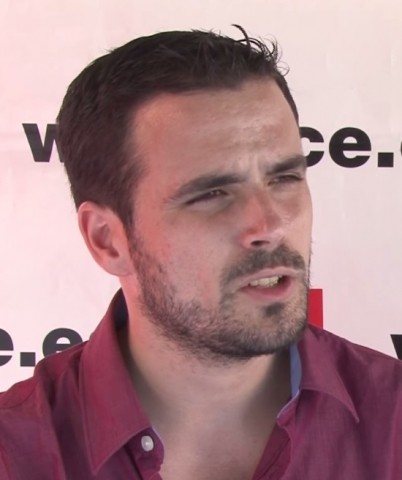 Pablo Iglesias for his part said he was “ashamed that in my country oppositionists are jailed” and added “we say free political prisoners”. This is better, but then it was marred by an official statement by Podemos, in which the organisation said that “all of this worsens the conflict and the guilty party are irresponsible arsonists, which only achieve the breakup of Spain”. Basically they put themselves in the camp of Spanish nationalism but they disagree with the methods of the regime.
Pablo Iglesias for his part said he was “ashamed that in my country oppositionists are jailed” and added “we say free political prisoners”. This is better, but then it was marred by an official statement by Podemos, in which the organisation said that “all of this worsens the conflict and the guilty party are irresponsible arsonists, which only achieve the breakup of Spain”. Basically they put themselves in the camp of Spanish nationalism but they disagree with the methods of the regime.
Worse than that, the statement laments the “breakup of the consensus reached in 1978 and the constitutional pacts reached by all Spaniards”. This is scandalous for a party, which was born out of the idea of breaking with the padlock of the 1978 regime! The 1978 Constitution was based precisely on the denial of the right of self-determination. It was the old regime, the King and the army, who wrote Article 2 of the Spanish constitution for that very purpose. This is the reason why the struggle of a Catalan Republic is progressive inasmuch as it questions the whole edifice built in 1978 as a result of the betrayal of the leaders of the Communist and Socialist parties.
How to take the movement forward
It is clear that there is now a very angry mood in Catalonia, which will be revealed in the next few days and into next week in a yet another eruption of the mass movement. The comrades of Revolució (the IMT in Catalonia) issued a leaflet last night calling for a mass movement for the release of political prisoners and to defeat Article 155. They argue for a general strike and above all for the strengthening of the Committees for the Defence of the Republic (which keep growing and now number 172).
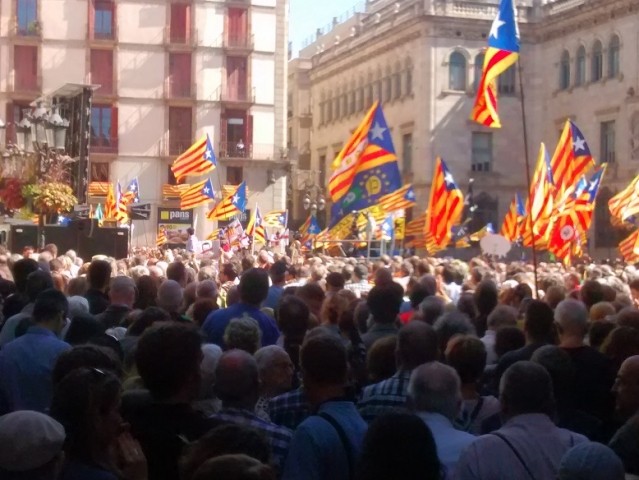
The only way to achieve a Catalan Republic is by revolutionary means. Institutional combinations, appeals to the “international community” and back door talks with the Spanish state have failed. In his speech on Tuesday from Brussels, Puigdemont made it clear that the Catalan government had ruled out open resistance against the application of Article 155 because that would have led to a renewed wave of repression by the state. In fact, people were prepared to fight. Workers in education, civil servants, journalists in Catalan state media, all had issued clear statements rejecting Article 155. People were waiting for a lead and none came.
The leaders of the government want the 21 December elections to become the main battle ground. In reality, the main advances of the movement have taken place through mass action in the streets and direct defiance of the state (on 20 September, the 1 October referendum and the 3 October strike). That is the only way forward. For that to be possible the bourgeois politicians of PDECAT (who would come fourth if there were elections today, with only 10 percent of the vote) must be overtaken by a more radical leadership based on the workers, the youth and the petty bourgeois masses, those who put their bodies on the line on 1 October to make sure the referendum would go ahead.

